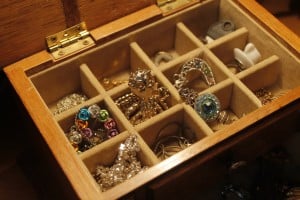Demystifying the Dark vs. Light Skin Culture
Many black media outlets and blogospheres are talking about the upcoming documentary directed by Bill Duke titled, Dark Girls. For those of you who are unaware of the “dark skin vs. light skin” stigma within and outside of Black Americas, I will try, to the best of my ability, to edify those who are unaware. I’ve also included a short clip of Dark Girls on this piece. I caution you that this clip will move you tears, for my tears kept flowing. For some of you, you will relate (either past tense or present). It is understandable that this topic would be shocking to other individuals who came from a society and/or ideology that a character of a person trumps race and/or skin complexion/superficial characteristics. I must confess that I am one of those who were shocked to learn of such “phenomenon” due to my parent’s values and cultural values instilled in me that skin is skin, black is black, people are people, and individuals are individuals.
My first experience of the “light vs. dark” skinned culture occurred when I was in middle school. I attended a summer school course program in a city that is outside of my sheltered, predominately Caucasian residence. The power went out in the school building and a boy, without any rhyme or reason, said to me “(insert my name here), Smile. So, I can see you.” At that moment, the room erupted with laughter and a girlfriend (white) of mine and one other male classmate (black) started arguing with the child (black boy) who made the comment. I recall smiling and laughing (for I have tendency to laugh sympathetically when others laugh: especially when I don’t get the joke. Similar to yawning when seeing others yawn). I actually had no idea what the boy was talking about. I even defended the boy who made the rude comment out of being unaware of the “joke.” The boy who came to my defense told me what the “joke” meant…that I was so dark-skinned that the only way anyone can see me in the dark is if I smiled. My first response was, “that doesn’t make any sense. He is black, too.” That is when the room died down with laughter. I didn’t realize it then that I unintentionally reclaimed my personal power. I believe it was due to my innocence of the “dark vs. light culture” that enabled me to turn back the “main issue.” The main issue is for black folks who are caught up in the “dark vs. light” debate that, no matter what color your skin is, you’re black. This I know, firsthand, residing in a predominately white community. Nobody ever made an issue why my mother was light-skinned black and my father was dark. In fact, I never really noticed it for Mom is Mom and Dad is Dad: as a family, we are all black. There are many tones in my family as well. Especially from my maternal side: my grandmother is mulatto (French for mixed ethnicity) and it never really dawned on me that she was of mixed race…Grandma is Grandma.
My Haitian cultural background has a proverb that goes, “Milat pov se neg, eg neg rich se milat.” Translated into English, “a poor mulatto is black, A rich black is mulatto.” Translated metaphorically into English, it means that, no matter what color your skin is, if you’re unknowledgeable and broke, the color of your skin will not help you. Hence, why I believe the “white privilege” is personally fallacy, nor do I believe that my skin color and complexion will hinder me to achieve “excellence”. I believe in visiting my relatives and seeing black people in government (including presidency). It never once thought that there wasn’t a career vocation that the color of my skin would hinder me from. Yes, I knew there would be individuals that would discriminate against me. Yet, I never allowed those individuals to keep me from thinking that I could never achieve myself. I must add that my father has a PhD and is a professor. My mother is a nurse. I have an uncle who was a prominent political and human rights attorney in Haiti. Another friend of the family was also a Supreme Court Justice in Haiti. So, I wasn’t caught up in the “black people will never obtain high position of power” hype. I remember my father would tell me his story of being a poor child in Haiti’s slums with the combination of achieving the “American Dream.” It was ingrained into me that, “this is YOUR country. You have no excuse not to succeed. Look at me? I’m just an immigrant.”
I feel sorry for individuals, both black and white, who actually believe their skin is a major factor at all times. It will be a factor occasionally, but not all the time. An example of this is the election of our current president, Barak Obama. That election awakens those who believe, still, that white privilege and black denigration is a fallacy (only if one chooses to open their eyes). People actually voted based on the president’s character, issues, and policy (the first time I ever witnessed an influx of campaign of Republicans for a Democratic president- Republicans for Obama). His skin color, for the most part, wasn’t a factor. I know some individuals who still want to hold onto the white privilege and black denigration are now coming up with other excuses (i.e.: you voted for him because he is black) so they can keep hold onto their ideology. If the case of voting for him because he is black is the truth, then why did Allen Keyes, a black Republican, not even make it close in the Republican primary? Or Cynthia McKinney, a black woman running in 2008 under an Independent Party? This is a new time and new world where the majority of the people are not holding onto the past. Yes, there are still a minority of the population that does. Yet, thank the gods and ancestors it is only a minority. My cultural background enables me to see that, when it comes down to it… it is not about skin color, but the haves and haves not. The skin color issue is the superficial issue that those who are white and blinded by the “white privilege” don’t realize that they, too, are being taken advantage of by their “white counterparts” who have more wealth than “they” do. An example is when individuals, who are white, speak about Mexicans in a derogatory manner to others (i.e.: taking away American jobs) for that is what they believe what others want to hear. Many of them don’t really mean it. They know that undocumented immigrants take jobs, at very low wages, that many Americans don’t want. In fact, many of the “bashers” own companies and/or have investments or trades in companies in Mexico or other countries that they can get cheap labor. They don’t want to pay their American peers “that much”. They also may hire Mexican workers very close them. Meanwhile, the disenfranchised Americans are focusing their anger at Mexicans, in this case. The individuals who “started it” are quite friendly with Mexicans. This is what my Haitian proverb taught me: looking beyond the skin and focus on the character and/or person.
United States’ history is very dark and silently continuing to be dark. For some, darkness brings an unspoken comfort. Yes, holding onto darkness, even though it causes one to be distressed, can be “comforting.” Any “light” is foreign and, at times, would be shot down. Some don’t know how to be comfortable within the light and without constant chaos. In the case of “dark vs. light skin” within black folks who adhere to it: it did start during antebellum slavery. Despite it all, individuals won’t keep that same method in the past. They continue to keep the method going. It’s no longer of importance that it started during slavery. What is important is why are “we” continuing to do it to this day? We can no longer blame “white folks” or “slavery” for continuing to segregate “our own” people when it comes to skin complexion. This concept I can say is kept going without reservation, for I am black and don’t even notice “dark vs. light.” I see beautiful people with their own unique physical and intricate characteristics (shape of the eyes, lips, cheekbones, foreheads, dimples, or no dimples). I’m similar to an art aficionado who can tell a Rembrandt painting from a Monet: even those who are replicating their paintings.
The “dark vs. light” cultural phenomenon is not exclusively within the black community. It is widespread. It was adopted via antebellum slavery without the individual black ancestors and descendants not realizing that “dark vs. light” was also perpetuated and, at times, continued today by even Caucasian individuals. For my Caucasian brethren and black brethren to understand this: I will try to explain it.
(Note: this is when I was growing up, in the 80’s to early 90’s for I notice a shift.) The culture is similar to little children (white) preferring the blonde hair and blue eyed doll over the brunette. Asking a white child who looks smarter: blonde doll or brunette- the child would most likely pick the brunette. Then asking who is the prettiest and that child most likely will pick the blonde. That is the “princess culture.” Now, enter the black US community: it is intense for individuals who adhere to this “ideal beauty” to know they can never be white. Blonde hair is not authentic, nor is blue eyes, (unless mixed with Caucasian ancestry) for blacks. Likewise with Asian ancestry, (even individual Asians are trying to look Anglo by having their eyes surgically rounded- I state Anglo for not all white “nationalities” have the same “characteristics”). They can never achieve that “Anglo blonde bombshell” look. So, many (not all) settle for the “next best thing,” which is being light-skinned black, long, “silky” hair, and light eyes (light brown eyes).
The thing with these young, impressionable, black children (and most adults) is that they don’t see the division within the “white culture.” They simply see the color of the skin (white) being advancement, without understanding that there is “more to it.” Blonde hair and blue eyes with a certain sized nose, a certain cheekbone, and the likes. Many, not all, only know that “light” (as in white) is “beauty” and by some, that equates intelligence.
You can see this with Caucasian children, as well. Parents dying their children’s hair blonde with highlights, braces, removal and/or hiding of freckles, etc. If Caucasian parents are perpetuating the “ideal” beauty…imagine that with black parents and/or children. Even in the days of Shirley Temple’s popularity—parents went out of their way to have a cute little curly-haired child. As is the “stereotypical ideal beauty” within the black US community…so it is within Caucasian’s US “community.”
Growing up, I recall classmates who were natural redheads being taunted. Redheaded women were stereotypically labeled “hot tempered,” similar to when black women who are assertive are labeled “aggressive.” Redheads were stereotypically, by some, labeled “promiscuous,” similar to the stereotypical black women being labeled “Jezebel.” Or, where individual black women and men hope their child would be “light skinned,” I’ve heard of redheads who hoped their child wouldn’t be a redhead: some go beyond that and wish their child would be blonde. As some individual black folks have lightened their skin, I’ve heard of those who were born with freckles having them surgically removed. It seems today in the “Tiara culture” it is having a child tan or spray-tanned. Back then, growing up, so many freckled girls used concealer and/or tons of foundation to conceal their freckles.
During the time of slavery with the “paper bag” litmus test: Caucasians also had their “paper bag rule.” Being very pale skinned was looked upon with favor for it symbolized that one does not work in the sun or brutal fields. Hence, where upper class whites can tell who the white farmer is from an “aristocrat”. Back then, it was en vogue not to be tan. Women carried umbrellas, open, during summery days to avoid getting a tan. Imagine how Italian immigrants felt. Those of, let’s say, Greek and Israeli heritage were ridiculed for their “big noses.” Many of them, even today, would have rhinoplasty for the ideal, mostly common, Anglo-Saxon nose. Today, it is pale-skinned Caucasians who are discriminated against. Those who turn red in the sun and not tan.
My point is: this is not unique within the black community, either. It is very painful, for the concept is linked during a painful part of black diasporas history. It is painful for “we” tend to personalize our struggle as nobody else ever experienced it. At times, we’re blinded with our own pain that we don’t see the pain in others, as well.
In hindsight, those with the “ideal beauty” are discriminated by individuals who have been tormented for not “looking like them” and those who “admire them.” The concept is that bullies create bullies. “Light-skinned black” women are told they are “not black enough”. I’ve even heard ugly profanity blending the history of slavery (raping of women) for the reason why they are so light. Presumption of “you think you’re cute.” In contrast, individuals not seeing you for who you are, but solely focused on the superficiality. They have the desire to be loved for who they are, not because of their physical characteristics that are beyond their control. Likewise, with Caucasians blondes that are tired of the “dumb blonde” jokes and having false admirers when they don’t know half of their internal pain of being labeled as “wholesome” or “loose.” They may have been a child and/or adult who is really rather introverted who despised the attention, but can’t seem to get away from unwanted attention.
Are there individuals who relish in their “societal” beauty? Yes, it from my own personal experience and perspective that they do so if an individual doesn’t have anything else to offer but looks. It is a pretty lonely world. We are so much more than just our “cloak of skin.” David Hume eloquently defines beauty, “Beauty in things exists merely in the mind which contemplates them.” Societal “ideal beauty” doesn’t have to be your own. The person’s next to you in line at a coffee shop “ideal beauty” doesn’t have to be your own. The most important person’s subjective view of “ideal beauty” is the person we each look at inside the mirror; the rearview mirror of our car, bathroom mirror, closet mirror, make-up compact mirror, bedroom mirror, dressing room mirror, and the endless list of mirrors…WE are the only opinions that we need, as individuals, that matters. Other’s opinion is really background noise. It’s a fallacy that others make you feel beautiful if you, yourself, don’t truly believe that you are beautiful…
“If that which you seek, you find not within yourself, you will never find without.” ~ Doreen Valiente















